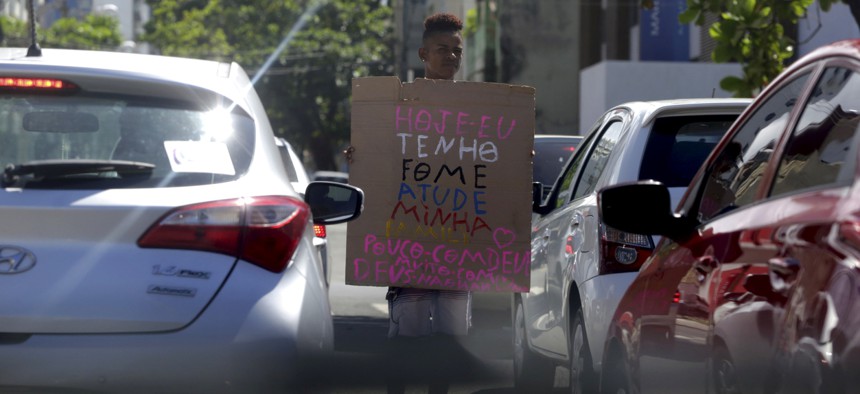A County Plan to Require Permits for Roadside Soliciting

istock.com/Joa_Souza
The measure, introduced last week in Montgomery County, Maryland, is designed to increase safety for pedestrians as part of a larger goal to end traffic fatalities.
Pedestrians would be required to obtain a permit before soliciting money from cars on certain roadways in Montgomery County, Maryland, under a bill introduced last week before the county council.
The measure aims to “improve pedestrian safety, and to reduce serious injuries and fatalities when pedestrians solicit and collect objects from vehicles in certain high-speed roadways.”
Councilmember Craig Rice, the bill’s sponsor, said the measure is a new iteration of a previous proposal that’s meant to support the county’s Vision Zero initiative to eliminate “serious and fatal collisions on county roads” by 2030.
At least two residents have died after being struck by cars while standing on medians in the county in recent years, Rice said—one in 2013 and another in 2017.
“One of the things that I just want to highlight is that, again, this is for all of our folks who stand in medians—not just our homeless population, not just those who are sign-waving, not just those who are soliciting for whatever sorts of charities are out there,” Rice said at the council’s April 20 meeting. “We, through our Vision Zero plan, have understood how risky it is to be in our roadways.”
As written, the bill would require a permit for adult pedestrians who want to solicit donations of any kind from vehicles while standing “in a roadway, median divider, or sidewalk” on “high-speed roadways,” where the speed limit exceeds 25 miles per hour. The permit would be free and contingent upon “certain safety rules,” including adhering to traffic-control signals and soliciting only during daylight hours.
The county’s Department of Health and Human Services would issue the permits, which would be available in a number of places, including homeless shelters, and would come with educational materials about traffic safety. Each permit would be valid for a year.
Rice, who worked on the bill with the Montgomery County Coalition for the Homeless, likened those safety precautions to the tools given to other people who spend time in roadways, including the neon vests worn by construction workers as well as jail inmates who are assigned to pick up trash along highway shoulders and medians.
“It’s saying that if people are going to put themselves in harm’s way, at least we’ll give them the tools necessary to try and keep them safe,” he said. “Nobody should be treated any less because of the fact that they may be homeless, or soliciting for any type of charity. From that perspective, I think this is a good way to approach our Vision Zero goals and also protect our residents.”
The bill is scheduled for a hearing May 11.
Kate Elizabeth Queram is a senior reporter for Route Fifty and is based in Washington, D.C.
NEXT STORY: In the Tales Told by Sewage, Public Health and Privacy Collide





